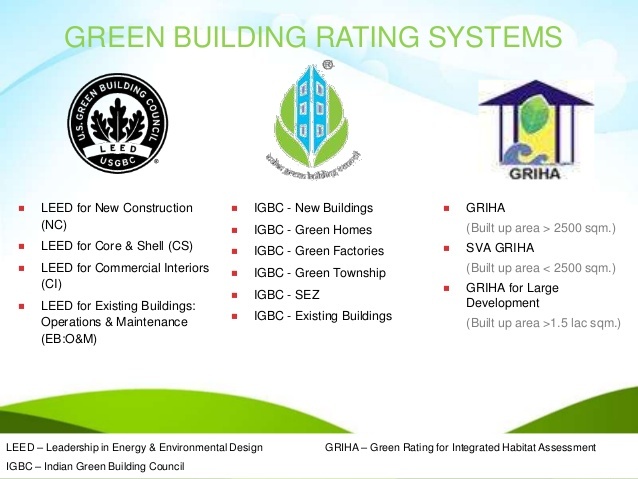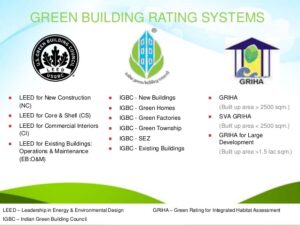
Green Building Certification in India for Sustainable Industrial Facilities

Recently in India, the “green building” concept in industries is gaining prominence as “green”. With climate change, businesses are seeking ways they could minimize their carbon footprint and conduct business sustainable manner.
One crucial aspect of achieving sustainability in industrial facilities is obtaining green building certification. In this article, we will explore the significance of green building certification in India for sustainable industrial facilities and how it can benefit businesses.
Why Green Building Certification Matters
Green building certification: It is a systematic evaluation process for measuring the environmental performance of a Building/ Facility. It measures how well these elements are in place — from energy efficiency to resource conservation to waste reduction. Various certification courses are gaining momentum in India such as LEED (Leadership in Energy & Environmental Design), GRIHA (Green Rating for Integrated Habitat Assessment), and IGBC (Indian Green Building Council) certification.
LEED Certification in India
One of the most well-known green building rating systems in India, LEED has been adopted not only by residential buildings but also by commercial and industrial buildings. LEED is administered by the United States Green Building Council (USGBC). LEED is a global system that provides the framework for a building’s design, construction, operation, and maintenance in order to become sustainable. It promotes sustainability in site development, water-saving measures, energy-efficient features, material selection, and indoor air quality. The fact that a facility has received LEED Certification in India signifies its commitment to Sustainability.
GRIHA Certification in India
GRIHA, on the other hand, is an indigenous green building certification system developed by the TERI (The Energy and Resources Institute) and supported by the Ministry of New and Renewable Energy (MNRE) in India. GRIHA focuses on reducing the environmental impact of buildings while enhancing the well-being of occupants. It evaluates aspects such as energy consumption, water management, waste generation, and the use of renewable resources. GRIHA certification in India is tailored to local climatic conditions and construction practices.
IGBC Certification in India
The Indian Green Building Council (IGBC) offers a comprehensive green building certification system that covers a wide range of building types, including industrial facilities. IGBC certification takes into account factors like energy efficiency, water conservation, site selection, and materials used. It provides a holistic approach to sustainability and promotes the adoption of eco-friendly practices in industrial construction.
Benefits of Green Building Certification for Industrial Facilities in India
Cost Savings
Green building practices yield lower energy and water utilization, which results in substantial cost deductions in the long run, for example, industrial facilities. The adoption of energy-efficient lighting, HVAC systems, and renewables can reduce the overall costs associated with operation.
Environmental Responsibility
Receiving LEED or equivalent certifications shows your dedication and responsibility as a “Good Steward” of the environment. It communicates positively with all stakeholders including clients, customers, and communities, confirming businesses are playing their part in building a greener future for everyone.
Compliance with Regulations
This is being seen across many Indian industries with more emphasis on environmental regulation & sustainable practices. Certification of green buildings can assist factories in remaining fully compliant with emerging requirements; this provides legal and other related safeguards that the factory may face.
Enhanced Brand Image
Green building certification enhances a company’s brand image and reputation. Consumers are increasingly favoring eco-friendly and sustainable products, and a certified facility can gain a competitive edge in the market.
Improved Working Conditions
Sustainable industrial facilities often provide better indoor air quality, natural lighting, and comfortable working conditions for employees. This can lead to increased employee satisfaction and productivity.
Conclusion
In a world where environmental concerns are at the forefront, green building certification has become a crucial tool for industrial facilities in India. LEED, GRIHA, and IGBC certifications offer a roadmap to sustainability, helping businesses reduce their environmental footprint and operate responsibly.
If you’re ready to take the leap towards sustainability and green building certification for your industrial facility in India, consider partnering with VMS Consultants.
VMS is a distinguished consultancy organization based in Ahmedabad, Gujarat, offering Engineering, Architecture, and Project Management Services to various industrial segments. We work on projects across India and internationally, providing expert services throughout the project lifecycle, from budgeting to construction and commissioning.
Contact VMS Consultants today and embark on your journey towards a greener and more sustainable future.
Remember, sustainability is not just an option; it’s a responsibility we owe to our planet and future generations.





